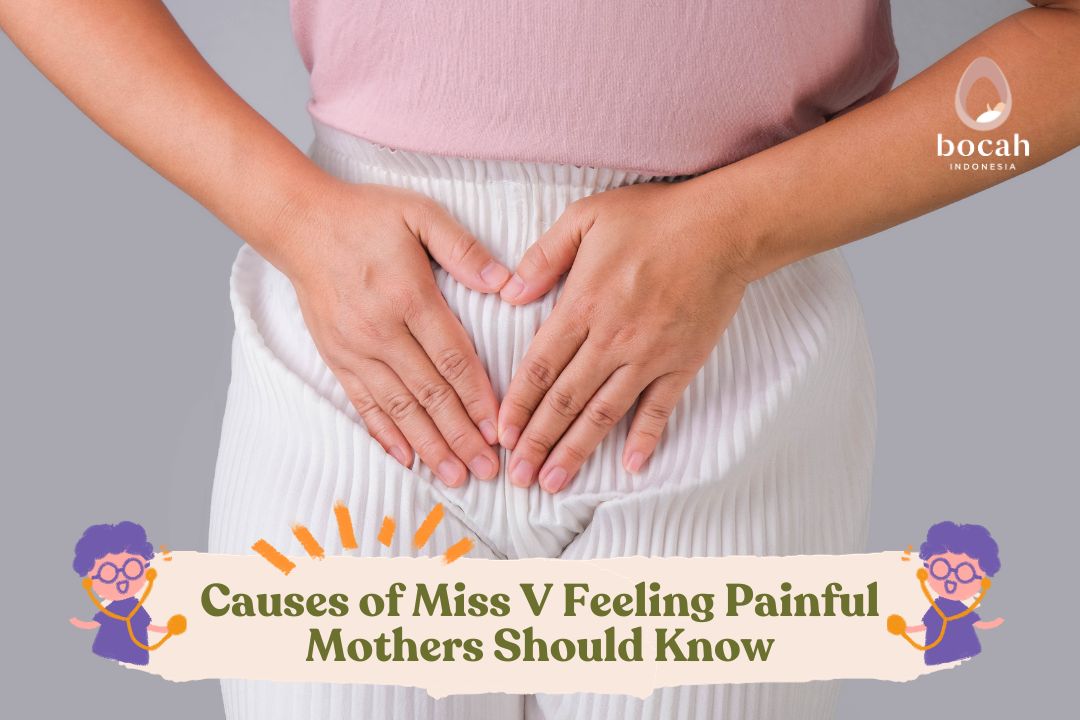The Causes of Miss V Feeling Painful that Mothers Should Know

The feeling of discomfort, pain, or pain in the vagina is often caused by medical or psychological issues. Find out the explanation here.
Discomfort in the vaginal area can be very disruptive. Pain can originate from the vagina itself or from the labia and the skin that forms the vulva (the outer part of the genitalia).
Pain, discomfort, or uneasiness in the “Miss V” area should not be ignored. It’s important for mothers to immediately find out the cause and how to address why Miss V hurts, because if vaginal pain is left untreated, bigger problems can arise.
Causes of Miss V Feeling Pain
Vaginal pain can occur in the vaginal area or it can also radiate from the pelvis or cervix. According to the UNC School of Medicine, the most common cause of vaginal pain is infection. Examples include:
Yeast infections
Tanya Ferly tentang Promil?
Gonorrhea
Chlamydia
In addition to infections, vaginal pain can also be caused by trauma to the Miss V area, which can be a result of sexual intercourse, childbirth, surgery, or other medical procedures.
Vaginal pain can also stem from dyspareunia, a condition where there is pain during or after sexual intercourse. This can be due to a lack of lubrication during sexual intercourse, caused by hormonal changes or a lack of sexual stimulation.
The discomfort in the Miss V area can also be related to psychological conditions, such as a history of sexual abuse. Lastly, pain in the vagina can be caused by vulvodynia, a medical term for chronic vaginal pain that has no known cause.
Women at Risk of Experiencing Vaginal Pain
Mothers should be aware that women of all ages can experience vaginal pain. Medical history including hormonal changes due to pregnancy, menopause, or hysterectomy can increase the risk of vaginal pain. Breast cancer treatment also carries a higher risk of experiencing vaginal pain.
Some medications can also increase the risk of vaginal pain. Statin drugs, which help lower cholesterol, are known to cause dryness in the genital area and also lead to vaginal pain.
Aging is also a risk factor. Menopause causes changes in hormone levels and vaginal tissue thinning. This affects vaginal lubrication and can be a cause of vaginal pain.
Examination for Vaginal Pain
If you are experiencing persistent or recurrent vaginal pain or discomfort, make an appointment with a doctor for an examination. The doctor can help diagnose the cause of the vaginal pain you are experiencing.
During a vaginal pain examination, the doctor will inquire about your medical history, conduct a physical examination, and if necessary, request a series of tests.
For the medical history, the doctor will ask about your health or condition, medical history, diagnosed medical conditions, and any surgeries or other medical procedures you have undergone. The doctor will also inquire about any medications you take regularly.
Next, the doctor may inquire about sexual health and sexual habits between you and your partner. The doctor may also perform a physical examination to check for signs of redness, swelling, damage, or scars in the vaginal area.
The doctor may also take a sample of vaginal fluid for testing. If there are unusual types or amounts of bacteria, yeast, or viruses, it could be a sign that infection is causing the vaginal pain.
If the doctor suspects a serious condition, such as cervical cancer, further tests may be recommended. This may include taking tissue samples from the cervix for analysis.
Then, if the doctor suspects that vaginal pain is related to psychological issues, you may be advised to consult with a mental health provider for evaluation.
Treatment for Vaginal Pain
To alleviate vaginal pain, the doctor will try to treat its underlying cause. There are several types of treatments usually recommended by doctors, and here are some of them:
Medications
If you have a bacterial or fungal infection, the doctor may likely prescribe antibiotics or antifungal medications to treat it. Finish the prescribed antibiotics, even if the symptoms improve before the medication is finished.
Stopping antibiotics prematurely can increase the risk of the infection returning.
The doctor may also recommend topical creams, such as lidocaine gel. This can help alleviate pain in the vaginal area. Topical medications can also help relieve persistent discomfort or pain during sexual intercourse.
If vaginal pain is due to chronic urinary tract infection (UTI), taking calcium citrate supplements may help reduce UTI symptoms contributing to vaginal pain. However, consult with a doctor before taking supplements or medication.
Surgical Procedures
In rare cases, the doctor may recommend surgical intervention to address conditions such as vulvodynia, vulvar vestibulitis, or cervical cancer. During surgery, the doctor will administer anesthesia injections or nerve blocks to help numb or desensitize the vaginal area.
Home Remedies
Some home remedies and over-the-counter (OTC) treatments can help alleviate vaginal pain.
Use lubricants if vaginal pain is related to insufficient lubrication during sexual intercourse; using lubricants can help reduce friction and discomfort.
Cold compresses can help reduce swelling and pain in the vaginal area. Place a clean cloth soaked in cold water on the painful area for a few minutes.
Regularly maintain genital hygiene using plain water or gentle, fragrance-free cleansers to prevent irritation and infection.
Avoid using soaps or body care products containing fragrances or harsh chemicals in the genital area, as this can cause irritation.
Choose underwear made of cotton and avoid tight-fitting underwear. This can help reduce irritation and improve airflow in the genital area.
Staying well-hydrated by drinking enough water is important to keep the body, including the genital area, properly hydrated. Water helps maintain skin and mucous membrane moisture.
During menstruation, it’s important to maintain extra cleanliness in the genital area. Change pads or tampons regularly and avoid using scented products.
If swimming or exercising, be sure to change out of wet or sweaty clothing promptly. Excess moisture can promote bacterial and fungal growth.
Certain foods, such as spicy foods, high-oxalate foods, and alcohol, can worsen pain symptoms. Try monitoring your body’s reactions to specific foods and avoid those that trigger pain.
Avoiding high-oxalate foods can help prevent UTIs. These foods include leeks, okra, spinach, almonds, peanuts, walnuts, and pistachios.
So, that’s an explanation of the causes of pain in Miss V and how to address it. Don’t forget to consult with a doctor before taking any medication to relieve vaginal pain.
For more information on reproductive health, pregnancy, infertility, and pregnancy programs, parents can find it on the Bocah Indonesia website.
Source:
- Willems, H. M., et al. (2020). Vulvovaginal Candidiasis: A Current Understanding and Burning Questions. Journal of Fungi, 6(1), pp. 27. Retrieved 2023 from https://pubmed.ncbi.nlm.nih.gov/32106438/
- Cleveland Clinic (2021). Pain Down There? 5 Reasons Your Pelvis and Vagina Hurt. Accessed 2023.
- Mayo Clinic (2023). Diseases & Conditions. Yeast Infection (Vaginal). Accessed 2023.
- Mayo Clinic (2022). Diseases & Conditions. Premenstrual Syndrome (PMS). Accessed 2023.
- Cherney, K. Healthline (2021). Everything You Want to Know About Vaginal Yeast Infections. Accessed 2023.
- Nall, R. Healthline (2019). What You Need to Know About Vaginal Pain. Accessed 2023.
- Fiber-Rich Foods Help Maintain Healthy Fertility - 26/07/2024
- Can Green Tea Really Inhibit Pregnancy? - 24/07/2024
- Selenium Content in Foods to Aid Pregnancy - 22/07/2024











